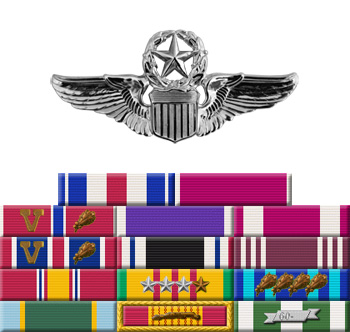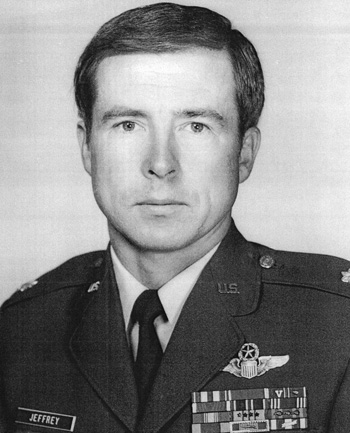
|
Robert D. Jeffrey |
 |
|||
| Rank, Service | ||||
Lieutenant Colonel O-5, U.S. Air Force |
||||
| Veteran of: | ||||
|
||||
| Tribute: | ||||
Bob Jeffrey was born in 1939 in Los Angeles, California. After attaining Eagle Scout, he graduated from Northrop Institute of Technology, and then entered the Aviation Cadet Program of the U.S. Air Force on January 25, 1960. Jeffrey was commissioned a 2d Lt and awarded his pilot wings at Reese AFB, Texas, on May 12, 1961, and then completed F-102 upgrade training at Perrin AFB, Texas. His first assignment was as an F-102 Delta Dagger pilot with the 509th Fighter Interceptor Squadron at Clark AB, in the Philippines, where he served from January 1962 to July 1964. Jeffrey then served with the 497th and then the 433rd Tactical Fighter Squadron at George AFB, California, from July 1964 to December 1965, and then deployed to Southeast Asia at Ubon Royal Thai AFB, Thailand, in December 1965. Capt Jeffrey was forced to eject from his stricken F-4 Phantom II while flying his 1st combat mission on December 20, 1965. After spending 2,611 days in captivity, he was released during Operation Homecoming on February 12, 1973. He was briefly hospitalized to recover from his injuries at Sheppard AFB, Texas, and then entered Southern Methodist University through an Air Force Institute of Technology assignment in August 1973. Col Jeffrey then went through Pilot Instructor Training in November 1976, and served as Operations Officer, Base Exercise Evaluation Team Chief, and Chief of the Operations Division with the 97th Flying Training Squadron of the 82nd Flying Training Wing at Williams AFB, Arizona, until his retirement from the Air Force on January 31, 1980. |
||||
|
||||

